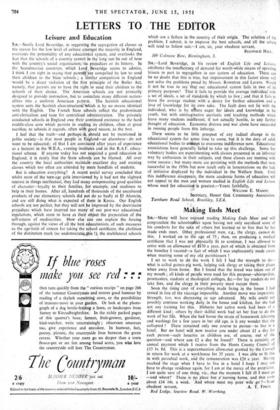LETTERS TO THE EDITOR
Leisure and Education
SM,—Surely Lord Beveridge, in suggesting the segregation of classes as the reason for the low level of culture amongst the majority in England, overrates the potentiality of any educational system, and overlooks the fact that the schools of a country cannot in the long run be out of tune with the country's social organisation,'its prejudices or its history. In the Scandinavian countries, which Lord Beveridge seems to admire, I think I am right in saying that parents' are compelled by law to send their children to the State schools ; a Similar compulsion in England would be a direct violation of the first principle of the Butler Act, namely, that parents arc to have the right to send their children to the schools of their choice. The American schools are not primarily designed to provide instruction, but to assimilate many different.nation- alities into a uniform American pattern. The Scottish educational system suits the Scottish class-structureOvhich is by no means identical with the English. The French State schools reflect the predominant anti-clericalism and taste for centralised administration. The privately conducted schools in England owe their continued existence to the hard middle-class core which persists in sending its children, often at great sacrifice, to schools it regards, often with good reason, as the best.
I feel that the truth—and perhapssk should not be mentioned in polite society—is that most people in England—or elsewhere—do not want to be educated: of that 1 am convinced after years of experience as a lecturer in the W.E.A., cvening institutes and in the R.A.F. educa- tional scheme. If anyone today has not acquired a good education in England, it is rarely that the State schools can be blamed. All over the country the local authorities maintain excellent day and evening lasses which too often are attended by mere handfuls of students.
But is education everything? A recent social survey concluded that whilst most of the teen-age girls interviewed by it had not the slightest interest in things intellectual, they had many compensating good qualities of character—loyalty to their families, for example, and readiness to help in their homes. After all, hundreds of thousands of the uncultured products of our elementary schools did not do so badly at El Alamein, and are still doing what is expected of them in Korea. Our English schools are not perfect, but they will not be improved by the doctrinaire prejudices which have inspired too many of our post-war educational regulations, which seem to have as their object the preparation of the self-esteem of mediocrities. How else can one explain the forcing through, against the views of all the best educationists, of such measures as the age-limit of sixteen for taking the school certificate, the abolition of the distinction mark (so undemocratic„ phis !), the multilateral schools which are a failure in the country of their origin. The solution of the problem, I submit, is to improve the best schools, and all the others will tend to follow suit.—I am, sir, your obedient servant, 109 Colmore Row, Birmingham, 3. REGINALD HALL.


































 Previous page
Previous page